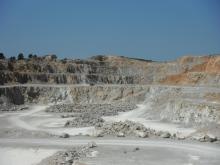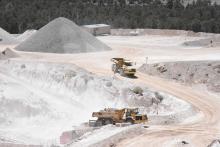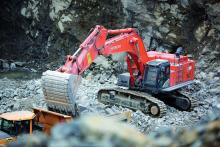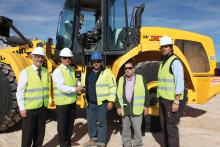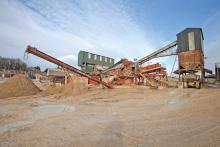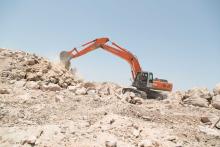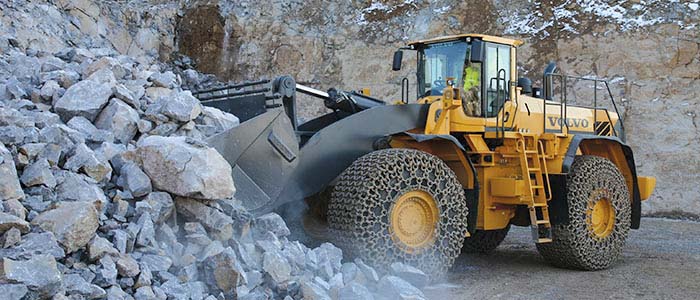
Briloner Hartstein Werk quarry is heading towards one million tonnes a year of extracted limestone with the support of the Swedish giant.
Some 155 million years ago, towards the end of the Jurassic period, a warm shallow sea studded with islands covered much of what is now Germany.
Lagoons were cut off from the ocean and within these warm, isolated bodies of water, nothing could survive for very long: any organism that fell in from the land or was washed in by the ocean was buried in soft carbonate muds.
Today these carbonate muds form a type of fine-grained, flat-cleaving limestone that has been quarried since the Stone Age for roof and floor tiles.
At the Briloner Hartstein Werk (BHW) quarry near Brilon, Germany, a
The machine is said to have impressed BHW after just one week, not only with productivity, but with fuel consumption of just 40litres/hour, saving up to 20% compared with the company’s previous machine.
Limestone has been extracted from the BHW quarry for over 60 years and today approximately 950,000tonnes are produced every year. With the limestone extending to an incredible depth of 500m at the site, BHW has only scratched the surface of the deposit, currently quarrying at a depth of 110m.
In order to extract the limestone, the material is broken out of the rock face using drill and blast techniques. It is then extracted and transported to the factory, where large rocks are crushed into a wide range of aggregate sizes.
The BHW quarry supplies a variety of industries, including construction, building materials, agriculture, and its products are even used in steelmaking, glass and plastics industries.
The company supplies businesses with limestone for cement production, and when used in agriculture, the stone is finely ground for use in animal fodder and feeds for dairy animals. When used for soil-improving purposes, its primary effect is to adapt the pH value of the soil, equalising the nutrient balance and ensuring improved fertility.
The Volvo L350F wheeled loader joins a Volvo EC700C, the largest crawler excavator in the Volvo family, and an L180G wheeled loader already in use in the BHW quarry.
The L350F loads 60tonne haulers in four or five passes, and is equipped with a long boom in order to reach the high loading height of the dump body, as well to protect both machine and tyres from damage during loading. In order to optimise productivity while working with limestone, the L350F is equipped with a 7m3 capacity Volvo bucket and a Boom Suspension System which helps prevent loss of loaded material by reducing shocks and rocking motions.
For managing director Heiko Sykora, the crucial factor in purchasing this machine was the combination of efficiency and services on offer.
“From our Volvo trade partner Swecon Baumaschinen, I am not simply buying a machine, but a full service,” says Sykora.
“As well as getting a good machine this also includes an all-round service package, such as advice, demonstrations, instruction and, of course, service and maintenance. We feel we have been well advised by Swecon Baumaschinen over the years and enjoyed the best possible support from their Customer Services.”
As well as keeping the boss happy, the four driver-operators say they have also been impressed with the new wheeled loader.
“The machine is easy to use, clearly laid out and attacks its task with real substance,” says driver-operator, Karl-Heinz Raschke.
“You don’t need to keep your foot to the floor to work effectively, as you have plenty of power in hand. This not only brings down the noise level, but above all reduces fuel consumption. I can return fuel usage figures of just under 40litres an hour.”
The L350F is powered by a 394kW Volvo turbo diesel engine.

